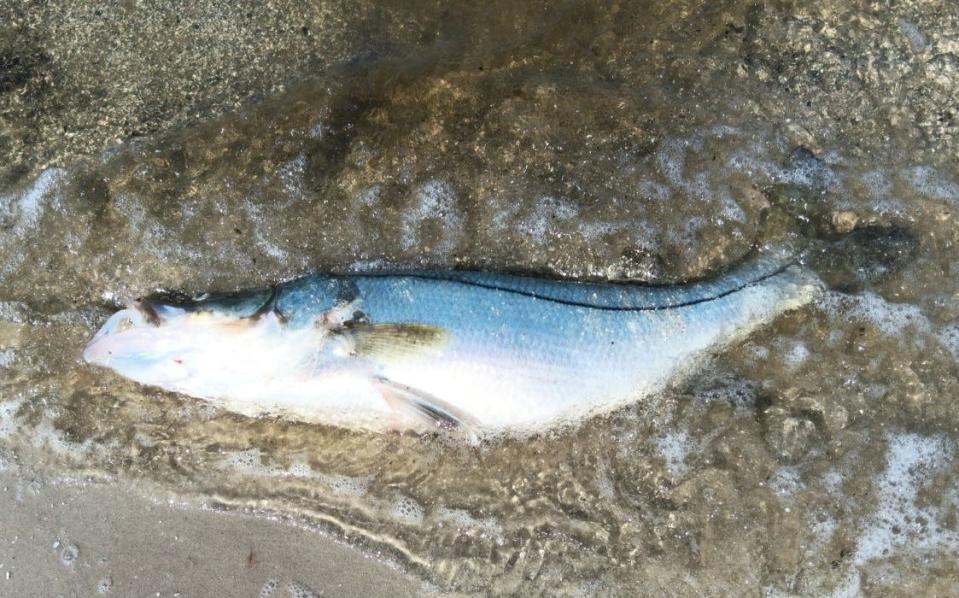'Dog days' of summer take a bite out of Indian River Lagoon fish in Malabar
The 'dog days of summer' took a vicious bite out of Indian River Lagoon fish in Malabar this week, killing untold thousands of finned and clawed lagoon creatures and lofting putrid odors into the Rocky Point neighborhood.
Thousands of dead snook, spotted seatrout, sheepshead, flounder, mullet, toadfish, puffer, stingray, blue crab and other marine species floated up dead near rocky point, the victims of extreme summer heat, rain and the often deadly breakdown of algae.
By Thursday, nature had taken care of most of the dead fish, as birds and other wildlife feasted on their remains. But scientists worry that fish kills are just beginning to heat up this summer, as algae that feed off human waste, fertilizers and hot rainy weather enter peak blooming time.

More: Heat, algae likely caused fish kill in Indian River Lagoon in Sebastian
"There's a few (dead fish) but they're getting eaten up," Rich Ulbrich, who lives at Rocky Point in Malabar, where the dead fish lofted putrid odor this week. "It was like everything got whacked," he added. "There were thousands of fish. It was virtually everything that was out there. .. This was everybody."
By Thursday, the lagoon near his dock looked much better. "Today it's crystal clear," Ulbrich said.
Scientists suspect recent heavy rains and extreme heat as main driving causes of the kill.
The levels of dissolved oxygen in waters drops as the temperature rise potentially suffocating sea life when it drops too low.
The "dog days" of summer started two months early this year, Duane De Freese, executive director of the Indian River Lagoon National Estuary Program, said via email. "Everything is feeling the stress of heat, patchy intense rainfall events and HAB (harmful algal bloom) conditions," he added. "My concern is that we have a lot of summer heat expected for next couple months."
Fish have been floating up dead this month in patches from Sebastian north to Malabar.
The die off is not yet extensive, De Freese said, with the worst reports so far around Rocky Point.
Scientists suspected heat also played a key role in killing a large number of fish in the Indian River Lagoon July 30 in Sebastian. That die-off involved a dozen species of saltwater and freshwater fish that floated for over a mile, from nearly the Sebastian River to Riverview Park, according to three people who reported the fish kill to the Florida Fish and Wildlife Conservation Commission's Fish Kill Hotline.
Those fish included snook, sheepshead, stingrays, mojarra, redfish, flounder and gar.
A nonprofit environmental group had been finding high bacteria levels in late July near where this week's fish kill in Malabar occurred, just east of Valkaria Airport.
Reports of large brownish red slicks on the water were reported from around Sebastian Inlet area at end of July. De Freese said that's likely from the collapse of a bloom of algae called Pyrodinium bahamense, which has dominated many parts of the lagoon this summer.
"When bloom collapses, decomposition of cells uses the available DO (dissolved oxygen) which is already low due to hot water temperatures," Duane De Freese, executive director of the Indian River Lagoon National Estuary Program, wrote in an email.
Numerous sensors showing low dissolved oxygen levels is driving the fish kill, he added. Lagoon water temperature reached the 90’s this week.
Rapid drops in salt levels in the lagoon after heavy rains also could be main cause for the fish kill, De Freese added.
There is a silver lining, though, he says: "The good news is poor water quality is still patchy. Some areas remain clear. Seagrass recovery is robust in Mosquito Lagoon and drops off as you move south."
How to report a fish kill
You can report a fish kill, diseased fish, fish with other abnormalities, or discolored water to the Fish Kill Hotline at FWRI/FishKillReport. It helps to include
The location of the event. The nearest street address or GPS coordinates are ideal.
The number of fish involved, and what species they are, if you can identify them.
Your phone number or email.
Jim Waymer is an environment reporter at FLORIDA TODAY. Contact Waymer at 321-261-5903 or jwaymer@floridatoday.com. Or find him on Twitter: @JWayEnviro or on Facebook: www.facebook.com/jim.waymer
This article originally appeared on Florida Today: Florida's summer extremes kill thousands of fish this week in Malabar

